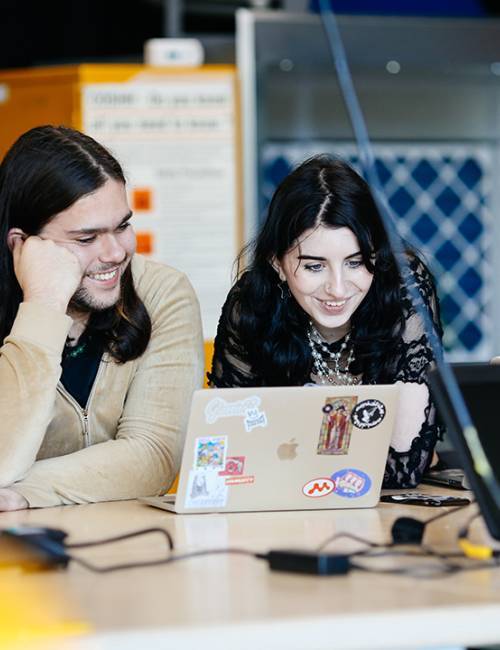Why system change works: Ravensbourne x Plant-Based Universities

Ravensbourne BA (Hons) Music and Sound Production student Mackie writes why they believe the university should adopt a plant-based food offering. Find out why and how to support their cause.
Would you like to live on a planet that isn't on the brink of crop failure, mass displacement, and increasing extreme weather events?
Most people would, but what is stopping us from creating these changes? Are politicians adept enough in addressing disasters? Well, unless it affects the next election results, mainstream political parties won't address this as urgently as needed.
Which leads us to ask, if not governments, then who?
Academic institutions and students have historically led grassroots movements, from the infamous 1960s sit-ins demanding an end to racial segregation laws in the US, to the 1989 student-led Tiananmen Square pro-democracy protests, to the 2019 global climate strikes led by Greta Thunberg.
Needless to say, as students and academics, we are at the forefront of change. Therefore, when the government doesn't act, we push as hard as we can to create mass positive systematic change with whatever powers we have.
This is the foundation of Plant-Based Universities, a student-led organisation that focuses on transitioning university catering to 100% plant-based as an urgent and key response to ending the climate crisis, by making the most sustainable choice the most convenient one.
Some individuals interpret our campaign as demanding a personal adoption of a 100% plant-based diet. While acknowledging the environmental benefits of such a dietary shift, we understand that it may not be immediately practical for everyone.
Our objective is to instigate systemic change by utilising the democratic processes within universities to advocate for a radical 100% plant-based shift in university catering facilities.
Research indicates that transitioning food production systems to fully plant-based could potentially reduce global land use for agriculture by 75%. [1]
This significant decrease in agricultural land use would stem from reduced land needed for grazing and a diminished requirement for land to cultivate crops.
Furthermore, meat, fish, eggs, and dairy use around 83% of global farmland, yet only provide 37% of our protein and 18% of our calories. Better use of this land could remove 8.1 billion metric tons of CO2 from the atmosphere per year. [2]
We hold the power to spearhead this essential transformative change. From Cambridge to Stirling, UCL to Queen Mary, Kent, and beyond, universities have already voted to transition their university catering to 100% plant-based in the upcoming academic years, each with differing timelines for implementation.
This leads to our final point; how do we pass this motion at Ravensbourne?
We've already engaged in fruitful discussions with some board members and the SU, and now our focus is on demonstrating that Ravensbourne, like many other universities, is also eager for this change.
If you agree please fill out our interest form attached below, it will be essential in proving to the board that we also want this positive and necessary change at Ravensbourne.
If we all work together, we can solve the climate crisis.
Sign our Petition
About the author
Hi, I'm Mackie (they/them), a third-year sound design student at Ravensbourne. I'm deeply worried about the climate crisis, especially with forecasts predicting around 1 billion climate refugees by 2050 [3].
Coupled with the current rightward political shift [4], I fear it may lead to unprecedented suffering, border closures, and potentially the resurgence of far-right fascism. Consequently, I believe addressing the climate crisis by implementing systemic solutions, must become a top priority.
Andy Rees quote
At Ravensbourne, we want to empower students to lead on positive change to enable a more sustainable and socially just world. That is why we welcome Mackie's project and want to hear from our student body on this matter, which will allow us to take their views and opinions into account as we plan for the future.”
References
[1] 'If the world adopted a plant-based diet, we would reduce global agricultural land use from 4 to 1 billion hectares', Our World in Data, 4 March 2021, Accessed 12 April 2024
[2] 'Reducing food’s environmental impacts through producers and consumers', Science, 1 June 2018, Accessed 12 April 2024
[3] 'Climate crisis could displace 1.2bn people by 2050, report warns', The Guardian, 9 September 2020, Accessed 12 April 2024
[4] 'How Europe’s far right is marching steadily into the mainstream', The Guardian, 30 June 2023, Accessed 12 April 2024
Bibliography
'Avoiding meat and dairy is 'single biggest way' to reduce your impact on Earth', The Guardian, 31 May 2018, Accessed 12 April 2024
'The Most Vegan-Friendly Universities in the UK', PETA, Accessed 12 April 2024
'Majority of universities in UK ‘not on track to meet emissions targets’', The Guardian, 9 December 2021, Accessed 12 April 2024
Further Information on Plant-Based Universities



